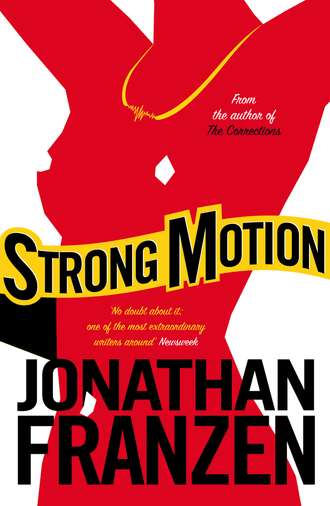
Полная версия
Strong Motion
Even though their own father used Sunday mornings for swimming rather than for worship, church school had never seemed optional to the Holland kids. Nine months a year Melanie herded them along in front of her, up the rear stairs of the church from the parking lot, and gave them a last push towards the classrooms while she proceeded into the sanctuary, there to occupy a pew close to the pulpit, not because such proximity made her a better Christian (that was for God to decide) but because she liked to have her clothing noticed. She kept going to church even after her children reached fifteen and proved unconfirmable—Eileen because girls with social lives needed to sleep late on Sunday, and Louis because he had a personality clash with every single person in the church. Despite ten years of Sunday school, the permanent escape from all further responsibility turned out to cost him no more than saying nope, I don’t buy it. It was the final proof that the Church’s authority could simply not be compared with the school district’s.
The horse farms now behind him, he was walking between swampy fields and dense black loaves of bramble. Abandoned among dead rushes, looking severe and prophetic, stood an entirely rusted bailer; as if they’d just picked the last flesh off its skeleton, two sea gulls wheeled away from it. Louis watched them until their wings dissolved in the whiteness and their bodies dwindled to the status of floaters in his vision.
The road to the beach seemed to rise and vaporize. It stretched out so long and straight that he started jogging, working the stiffness out of his legs, running faster. Soon, as he heard his breathing grow heavy, and as he watched the cordgrass and rockweed of the marshes bob up and down with the motion of his head, it began to seem as if he were watching a scene from a movie, a scene of a psychopath closing in on a girl in underthings, where the killer’s point of view is rendered with a moving handheld camera and heavy bronchial action on the sound track. This sensation became so powerful and disturbing and his breathing filled his ears so much that by and by, to reclaim himself, he began to chant aloud: “Ho! Ho! Hey! Me! Here! Here! Ho!” This did the trick, but something else must have been happening as he ran down this road, because when he passed a guardhouse and abruptly drew up and slowed to a walking pace, he felt as if he’d run not only out of the marshes but clear out of Sunday as well, ending up in the dunes of some eighth, nameless day of the week which he was the only person in the world to know about.
A siren was wailing in his head. The sky (if sky was the word for a thing commencing directly before his eyes) was still the same uniform white, but now it seemed as if the sun were hovering right beyond the threshold of visibility, an arrow’s flight away and single-serving-sized, and as if, when the mists blew off, the proximate borders of a miniature world would likewise be revealed, an un-threatening brooklike void now lapping behind him in the direction he’d come from, the direction of Sunday and his mother and her wealth.
He entered a parking lot. Its perimeter was guarded by a detachment of green barrels stenciled with a single word: PLEASE. Clumps of beach grass to the seaward side were suspended in the air, the supporting dunes invisible. Through his feet he thought he could feel the impact of waves, the faint shudder. The siren left his head and localized itself in a lone, cloglike Le Baron parked at the far end of the lot. Its theft alarm was ringing. Then the ringing stopped, but it had stretched something inside Louis’s head, some musclelike apparatus that continued to throb after the sound was withdrawn from it.
He was still trying to figure out what kind of place he was in when a black animal came charging up from behind a trash barrel. It was a retriever, fully grown. She skidded past him and paused in a playful attitude, head lower than her tail. Then she jumped on him. He removed her paws from his chest but it was like dealing with a rubber ball, the paws bouncing back into his hands as soon as they’d hit the ground. One of her tags listed a 508 number and the name JACKIE. There was no owner in sight. She followed him companionably up a wooden walkway and onto the sand, sniffing his footprints as they formed.
The beach was rain-soaked and unpeopled. Brown waves were stopping in their tracks, each of them like a failed quarterback sneak, the opposing forces meshing and falling to little purpose. Well south of the parking lot, at a point where the beach widened and a creek carried iron-rich mud out from behind the dunes, the dog suddenly took off running. She turned her head hard to one side as though she wanted to look back at Louis but also did not want to slow down, and then without showing even this much regret she ran harder, far, far up the beach, and disappeared.
He felt a stab of real loneliness then. He sat down on a rock and propped his chin on one hand. The sea drew breath like a sick person; time stretched long between the impact of one wave and the reassurance of the next. The breakers were dark and rotten with suspended sand and organic matter. All Louis could see in the direction in which the dog had run was sand, water, mist.
Though he’d laughed, it hadn’t really surprised him to hear that Eileen had already tried to tap their mother’s new resources. Very early in her life Eileen had acquired the ability to beg from Melanie and live with herself afterward. In the years of their com mon adolescence, Louis would often pass her on the stairs and see her folding up one or more twenties, and then in the dining room he’d find further evidence of a transaction, the maternal purse occupying a new place on the table and its owner visibly composing herself, a message for him in her eyes: The wallet has been put away now, so don’t you be asking me, too. Which was interesting, because he never did ask, not even when he had a need more compelling than Eileen’s need for another lightweight Benetton item or another concert ticket. He never asked because it somehow always seemed that Eileen had beaten him to it. And this must not have been a matter of timing, since whenever it did occur to him to ask, he always felt he had to hold off for a while because Eileen had asked so recently, and while he held off she would go and ask again and receive again. It was clear that if she really had beaten Louis to their mother’s money, she’d done it long ago, once and for all.
The day was bound to come when they met in the hall and did not pass in silence. It came the same summer that Eileen put the car in the lake. Louis had returned from mowing grass, and in the hall upstairs he saw her with the usual twenties in her hand, twenties folded into quarters and held with the nonchalance of a victorious dog walking from a fray with a disputed scrap of pot roast in its teeth. Long-compounded resentment and the ugliness of the fingers clasping the twenties made Louis say, “How much do you have there?” She said, “How much do I have where?” He said, “In your hand. Maybe you’d like to give me twenty of that.” She stared at him as though he’d suggested she take her shirt off. “No way! Go ask for yourself. I asked for this for me.” He said, “Yeah, well, you just asked, so what am I supposed to do?” She said, “I asked for this for me. You can go ask for yourself.” And he said: “I don’t feel like asking. I like to earn my money.”
It was as if she’d known all her life that this moment would come. Her face boiled and she threw the poisoned bills at his feet and slammed the door of her room behind her. Later, from his own room, Louis heard his mother say, “Eileen? Eileen, honey, you dropped your money out here.”
In truth, Melanie might have preferred to be more evenhanded, especially if it hadn’t involved increased outlays. Certainly she took Eileen’s requests as opportunities to upbraid her for her selfishness and to make an example of Louis and his independent spirit. But with one of her children making no demands at all, it became not only financially feasible but personally more convenient just to give the other child everything she wanted. Eileen could be supernat-urally silent and evil when something had been denied her. She sat at the dinner table and stared at Melanie’s clothes and her jewelry so long and so hard that she began to poison the simplest of her mother’s pleasures. She would not relent until money or its equivalent in goods was offered. It was joyless, this conspiracy between mother and daughter, but it worked. The end of the conspiracy was to keep the money unpoisoned, and to achieve this end only Louis had to be tiptoed around, since his father could satisfy his few personal wants through direct withdrawals and otherwise left everything to Melanie. Only Louis—odd, grumpy Louis—had the power to poison money. The others’ comfort depended on his restraint. And he exercised this restraint, and deliberately let Eileen be spoiled, and only once, when he confronted her in the upstairs hall, was there any hint of all the poison pooling up inside him.
Eileen went to Bennington College. It was the best school she’d gotten into and was the choice of Judd, her North Shore boyfriend. It was also the most expensive undergraduate institution in the country. She and Judd had broken up before they arrived for orientation.
Two years later Louis went off to Rice. Rice was cheap and had offered him a good aid package. He worked seventeen hours a week behind the circulation desk in the library, which had the strange effect of making his face widely recognized on campus. He also played poker avidly and kept records in a notebook; by the end of his junior year his three-year average weekly earnings were a very respectable $0.384. He was still accumulating debt, though, and so when an opportunity arose to cut expenses drastically during his senior year, he seized it first and questioned the wisdom of this only later, when his troubles had already begun.
His father had put him in touch with an old grad-school acquaintance of his, a man named Jerry Bowles who taught at Rice and lived with his wife in a house a few blocks west of campus, on Dryden Street, south of Shakespeare, north of Swift. Mr. Bowles had developed a heart condition and was looking for a student to do heavy yard work in the spring and fall in exchange for room and board. Louis appeared to be ideally suited for the job. When he returned to Houston in late August, the Bowleses picked him up at the airport.
During their interview with him the previous spring the Bowleses had been brisk and businesslike, but now that Louis had arrived, like a toy from a catalogue, they were like children scrambling to unwrap him and see if he worked the way they’d hoped he would. They had a toy of their own making, a daughter, an only child, but she was away at school and apparently no longer much fun to play with. Louis was their new enthusiasm. Over dinner the first night they kept editing each other:
“MaryAnn is more than happy to make lunch for you—”
“Jerry, there is no question of me not making lunch, we did offer him full—”
“Do you have some kind of tupperware container that you could—”
“Louis, I am always in the house. I am always in the house, so whenever you want to come home, it makes absolutely no difference—”
“We may be a trifle more particular about dinner—”
“Jerry, why, Jerry, why do you—”
Louis, between them at the table, ate his pork chop and minded his own business the way he used to on the El in Chicago, when a maniac had taken the floor. He’d made a mistake, he could see that. He’d stumbled into the wrong car. But he wasn’t riding for pleasure, he was riding to save money.
Mr. Bowles had a trim white beard and a pipe that he often chewed on and still sometimes smoked. When he wasn’t teaching linguistics, he patrolled his property for weeds and brown branches and crooked flagstones, for dripping faucets, squeaky floorboards, sticky doors, torn screens and dirty windows. His hammers and saws and clippers hung on pegboards with each tool outlined in black magic marker. He didn’t seem to have any friends or hobbies. He liked to explain to Louis how things were done in his house. He rationalized in detail every aspect of his wife’s cooking, relating how she had come to steam vegetables instead of boiling them, how a creamier mashed potato was achieved, and how, over the years, with his own input, she had reached the decision not to serve meat more than twice a day. He outlined ergonomic methods of stacking dishes and reading a newspaper. A recurrent theme was their water softener and its manifold virtues. Louis listened to these discourses with a compassion bordering on horror.
“Look at the look he’s giving you,” MaryAnn said. “Jerry. Look at the way Louis is looking at you.”
“Is something wrong?” asked a potentially miffed Mr. Bowles.
“Maybe he’s heard enough for now about soft water,” said MaryAnn.
“I’m sorry,” Louis said, shaking his head as if to clear it of cobwebs. “I was thinking about—something else.”
MaryAnn twinkled. “Like maybe some blueberry pie à la mode?”
MaryAnn was younger than her husband. She wore shawls and sandals and floral print dresses cut low to highlight her large and blue-veined bosom. She could often be found, silent, silent, in the corner of the gleaming laundry room where she ironed shirts and pillowcases and underpants. The house was full of places where she sat and rested. She kept books near all these places and could sometimes be seen setting one aside (Sigrid Undset, Edith Wharton, D. H. Lawrence), but the bookmarks never seemed to advance. The lunches she packed for Louis were heartbreaking: sandwiches on stone-ground wheat bread, carrot sticks, watermelon pickles, Bartlett pears, slabs of homemade yellow cake. The lunches he’d made himself in Evanston generally consisted of baloney on white bread, a banana, Twinkies when in stock, and a package of Del-Mark potato chips. In his entire life he’d never seen Del-Mark potato chips anywhere but in his mother’s kitchen.
He was tactful enough to wait four whole days before telling MaryAnn that he didn’t plan to be eating his dinners on Dryden Street. He said it would be best if he packed both lunch and dinner in a bag to take to campus.
MaryAnn had clearly been expecting this. “I’ll pack them,” she said sadly. “Although I can’t really feed you very well from a paper bag.”
It wasn’t, Louis said, that he wouldn’t enjoy eating dinner at home. But he had his senior thesis and his duties as station manager at KTRU to consider.
“Well,” said MaryAnn. “Maybe on Sundays you’ll have dinner here with us? And any other day you feel like it.”
This would not be the last time that he reviewed the logic: (1) he needed to be polite because (2) he was getting a good deal here and (3) thereby avoiding debt. “Sundays, sure,” he said. “That’s fine.”
It had been fifteen years since anyone had regularly made breakfast for him, and he had never in his life seen anything like the breakfasts MaryAnn made. He got fresh biscuits, fresh oat-bran muffins, fresh corn muffins, slab bacon. He got berry pancakes, veal-and-fennel sausages, french toast and cheese soufflés and steak and eggs. He got eggs scrambled with chives and sour cream, eggs Benedict, whole-grain hot cereals with cream and brown sugar, broiled grapefruit, homemade cinnamon-raisin bread, winter peaches topped with vanilla ice cream, honeydew quarters with strawberries in their hollows. After she had served the food, MaryAnn sat down and quietly drank coffee, showing him her profile, her jutting breasts. The terms of the moral problem were vivid to him each time he came to the table: It would be better not to accept this food. But he was hungry and the food looked very good. He continued to eat the breakfasts even when his pity for MaryAnn began to give way to something closer to alarm. It was a bad moment when he discovered that she’d been darning his socks. It was an even worse moment when a DJ at KTRU opened Louis’s sack dinner and found the tupperware pie-slice container which he’d repeatedly declined to carry, and a note from MaryAnn that read: Maybe you can buy some ice cream for the pie?
One Friday night in January he came home at midnight with a head full of tequila and found MaryAnn on her knees in the dining room, unpacking her collection of Wedgwood teacups and saucers from the breakfront. “How’s my acolyte?” she said. She thought his eternal white shirt and black pants made him look like an acolyte. She told him to sit down. He did so, his body leaning in the direction he wanted to go: upstairs. She took out piece after piece of china, murmuring that she ought to get rid of it all, sell it, what a stupid lot of cups, she’d had no idea how many there were. Finally she was kneeling in the midst of the entire collection, the tassels of her shawl fanned around her. “Take some.” she said angrily, dumping a cup and saucer on Louis’s lap. “Take a couple, take four. Who on earth would want these? You don’t want those.”
“Sure I do.” Louis was pale and perspiring. “They’re handsome.”
“You know,” she said, “I used to be in love with England. The whole country. I used to think I’d be considered pretty there, or prettiness wouldn’t matter. Like it was some wonderful old minor league I’d shine in.”
“You are pretty,” the tequila said.
MaryAnn shook her head. “When I got my master’s in English I was in New York. I went to work for the Duncan McGriff Agency, it was a big literary agency. I suppose we had some famous clients, but the way we really earned our money was by charging reading fees. I wasn’t a reader. I was the person who took the readers’ reports on manuscripts and turned them into personalized letters from Duncan himself. I had a sheet with about twenty different ways to personalize them, to say how he’d read the manuscript while he was sitting at home by his swimming pool where his three dear children were frolicking. Or how he’d read the manuscript on a mountaintop while watching a glorious sunset. This is literally what I had to write. But the sad thing was, no matter how bad a manuscript was, I always had to say that the work showed great promise but was not yet in commercially salable form. And there were various degrees to this, because there were people out there —innocent people out in Nebraska—who would send in their manuscripts again and again, and pay the full fee every time, and we could never say yes, and never say no. Which was also how Duncan was with me, although that’s a different story. I worked there for five years. I was still sitting there in my little chair at my little desk the day the Justice Department came and closed us down for an even worse thing we were doing. And Louis, I was twenty -eight then. It was like I’d been stabbed! It’s funny, twenty-eight still seems an old age to me, like I was never an older maid than I was that year. I couldn’t believe it, I mean, what had happened to those years. But so anyway, I married Jerry, and that’s when I really started to panic, because the feeling didn’t go away. The feeling that I’d missed my chance to have the life I wanted. Everything still eluded me, except now it was worse, because now I was married. It wasn’t so much that Jerry—well, you know him. It wasn’t his fault. I knew what he was like and I married him. It was my fault. And do you know, once you’ve started to think about something, once you’ve gotten it in your head that you have insomnia, it makes it all the harder to fall asleep?”
Louis was drifting in a slow spin towards the center of his empty teacup. MaryAnn gave him a glance full of hurt and worry, as though it were he, not she, whom she felt sorry for. “Well,” she said in a lower voice, “when I saw how nothing changed when I got married, I got it in my head that nothing ever would. I made Jerry hate me and then I said to myself: I have a husband who hates me. Do you see? There’s an aloneness you can catch like a disease and not get rid of. A wrongness—a wrongness you can never fix. And it was the same thing when we adopted Lauren. Like everything else, it was my idea. I wanted to stop the slide, and the one thing I knew was I’d never seen a woman who didn’t love her baby. But Louis—” Tears rushed into her face and voice and then receded. “I didn’t have faith! I didn’t have faith! The whole time we were dealing with the agency, I felt cold and dead inside. I tried to rationalize it. I said to myself, everything will change the instant I get to hold her (or him, we didn’t know). But in my heart, in my heart, all I thought was: Maybe this won’t work either. Maybe I’m the woman who even motherhood won’t change. This is what I felt, in my heart, and I still didn’t stop the process. Even though I was sick to my stomach every time we communicated with the agency. Sick for a week, from guilt and the strain of pretending to feel something I didn’t. And then when she came— well, it was already a bit of a disappointment that she was eight months old. You know, of course I’m the one who gets the eight-month-old baby.”
She pressed her crossed arms into her breasts and rocked a little. Louis dimly wondered what was so wrong with a baby being eight months old, but—
“But it was either that or nothing at all, and you know Jerry and I don’t discuss things, we just blame each other afterward. But that wasn’t the worst thing. The worst thing was that Lauren knew. Even when she was tiny she could feel me doubting myself. She could feel how I didn’t really believe I was her mother. No matter how hard I tried, I couldn’t get us to believe in me. And how could I blame her then for all the things she did to me? For biting me like an animal? For the gutter language? For all the worry and the dread when she wouldn’t come home? How could I feel anything but guilt? Guilt, Louis, was the biggest thing of all. That this was our life, our only life, and this was what I’d done to it. I was not going to get another chance. Do you see?”
She looked up at him beseechingly, leaning forward, seeming to want to pour her breasts out at his feet. She must have forgotten who she was talking to. She must somehow have been thinking that when she looked up at him he would take her in his arms and rescue her. But all she saw was a drunken college boy swallowing a yawn. “Oh God.” She turned away, furious with herself. “Why, why, why do I ever speak?”
After that night, things were more straightforward between them, more like they were between Louis and his own mother, more realistic. MaryAnn didn’t watch him eat his breakfast anymore; having explained herself to him, she could afford to be anywhere in the house. He was part of the family now—family meaning action at a distance, invisible fields that pass through walls. He began to count the weeks until he was free of Dryden Street.
During Easter vacation the Bowleses urged him to bring someone over to dinner to help finish up the rack of arctic caribou a colleague of Mr. Bowles’s had brought them back from Elsemere Island. Louis invited a girl he was friends with, a DJ at KTRU from whom he’d been learning about Wagner and Richard Strauss and with whom, in a mutuality of opportunism, he’d been spending some afternoons in a dormitory bed. MaryAnn seemed to have intuited this circumstance. Over the braised caribou she patronized his friend relentlessly, harping in particular on the beauty of her hair, as if it were understood that lookswise her hair was all she had going for her. Afterward, as he walked her home, the friend said she didn’t think Mrs. Bowles was very nice. “She’s crazy,” Louis said. “They’re both crazy.” Nevertheless, the idea had been planted in his head that this friend wasn’t necessarily worthy of him, and he soon began to patronize her himself and then avoided her entirely.
The next morning he woke up very late with a queasiness he associated with the questionable taste of the caribou. When he stepped into the hall, in his gym shorts and gray T-shirt, it took him a moment to notice the girl standing against one wall of the alcove beyond the stairwell. It was like the moment when you realize there’s a bird inside your house which happens to be still now but could fly into your face at any second. The spot in the alcove where the girl stood was just the kind of meaningless random spot where a bird in its confusion lands, and where Louis himself, in Evanston, could frequently be found. The girl was wearing a tight black tank top and a gray-and-white plaid miniskirt; she had a bimboish cumulus of dark blond hair, long bare legs, green ankle socks, and shiny shoes. Her fists were clenched and her jaw was set. Her chest was heaving with what appeared to be rage. She gave Louis a white-hot look, and his heart jumped as violently as if suddenly wings were flapping along walls and claws and a beak veering past his eyes.








